The Media Buried What Was So Important About the Hunter Biden Laptop
The "so what" isn't Hunter's lurid photos. It's credible allegations of Joe's corruption.
Hunter Biden, the son of the president, has been in the news in the last few days, having been found guilty on federal gun charges.
As part of that, we’ve seen a lot of discussion of his laptop, used as evidence in the trial. The discussion of it of late was muted compared to the initial drama about its provenance from 2020, right before the last election.
While the laptop drama has become a symbol of press malfeasance, what’s critically important is what the whole mess served to obfuscate: credible corruption allegations on the part of then-Vice President, now President Joe Biden.
What I fear too few people remember about the ordeal was the lede of the New York Post’s initial reporting: “Hunter Biden introduced his father, then-Vice President Joe Biden, to a top executive at a Ukrainian energy firm less than a year before the elder Biden pressured government officials in Ukraine into firing a prosecutor who was investigating the company.”
As Washington (and many beyond) continues to convulse about the misdeeds of a former president, I wanted to revisit the story of how the mainstream media buried a story about corruption from the current president on the eve of the first electoral meeting of the two men in late 2020.
News coverage: The story begins with a bombshell scoop from the New York Post, titled “Smoking-gun email reveals how Hunter Biden introduced Ukrainian businessman to VP dad,” on October 14th, 2020.
The explosive article outlines how then-VP Biden used his position to push out a prosecutor in Ukraine who had set his sights on a company Biden’s son, Hunter, sat on the board of, having been recruited to bring in precisely the type of influence that could be required to deal with the situation. As the lede summarizes well:
Hunter Biden introduced his father, then-Vice President Joe Biden, to a top executive at a Ukrainian energy firm less than a year before the elder Biden pressured government officials in Ukraine into firing a prosecutor who was investigating the company, according to emails obtained by The Post.

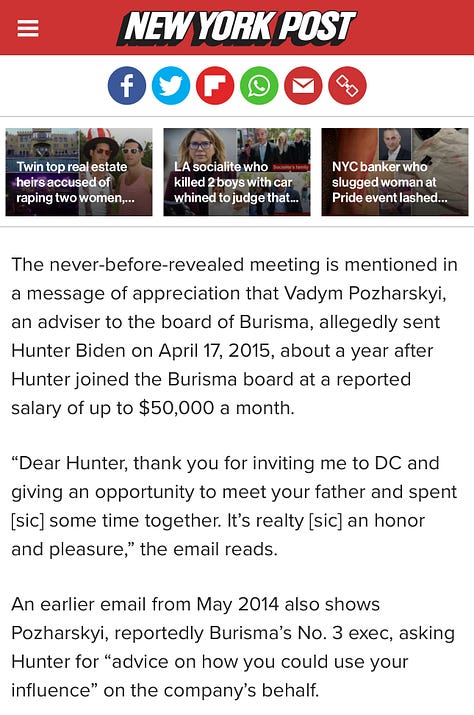
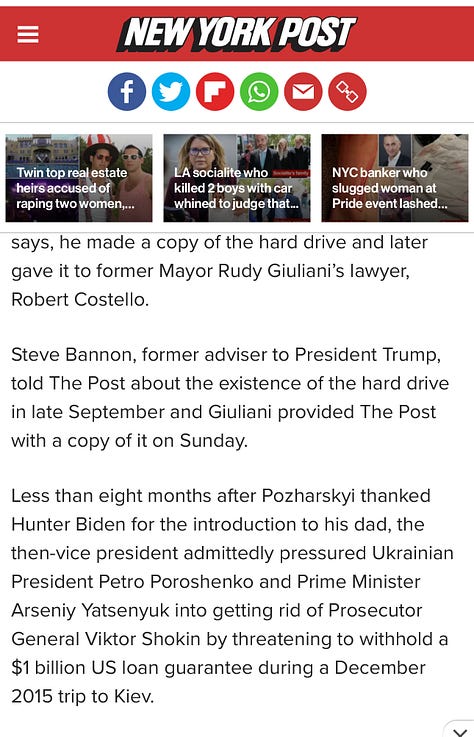
But the mainstream media cried foul. They doubted the provenance of the details of the story, it’s connection to the campaign of former President Donald Trump, and the timing, among other details.
Social media giants Twitter and Facebook made it impossible to share the story, even preventing accounts from direct messaging (DMing) the article and others related to it. The companies pointed back to their “fact checking” “third party partners,” who had flagged the piece. Those partners, you won’t be surprised to find out, are the same mainstream outlets who were racing to smother the news. Those publications, in turn, used the decisions of the social media companies to validate their disbelief of the reporting: a display of entirely circular logic.
CBS News called the Post reporting “controversial.” Washington Post applauded the social media companies’ “year of…scenario planning exercises” around fighting disinformation in the lead up to the election. AP said the underlying story was “unverified” and thus deserving of censorship.
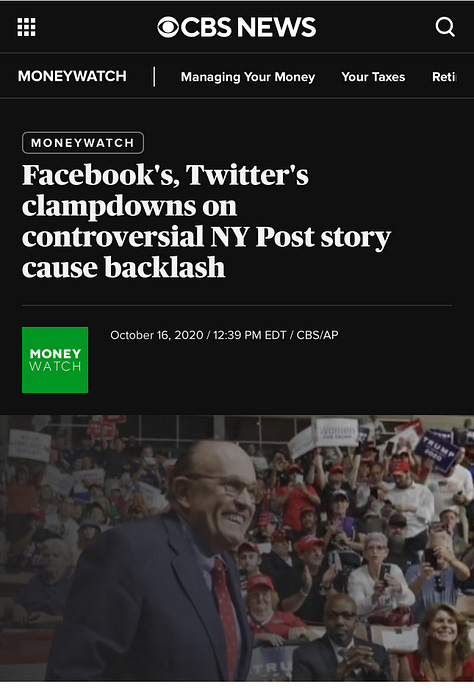
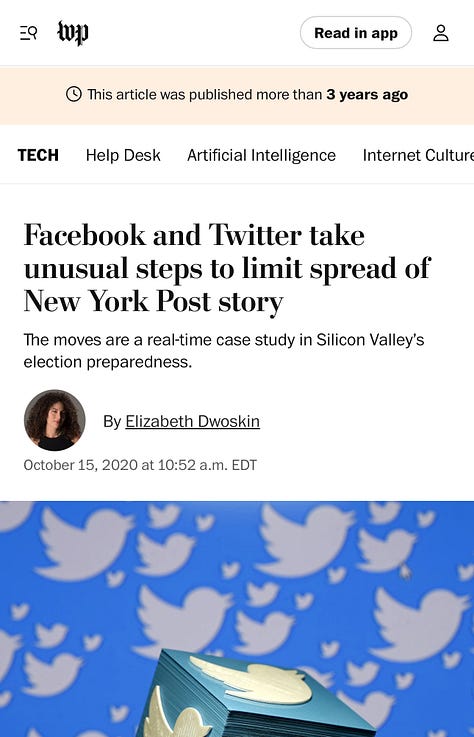

At the same time, an important detail of the story was transmuted. While the scoop was fundamentally about corruption allegations against now-President Joe Biden, the story would henceforth be covered as about his son. A one-day before-and-after from NPR:
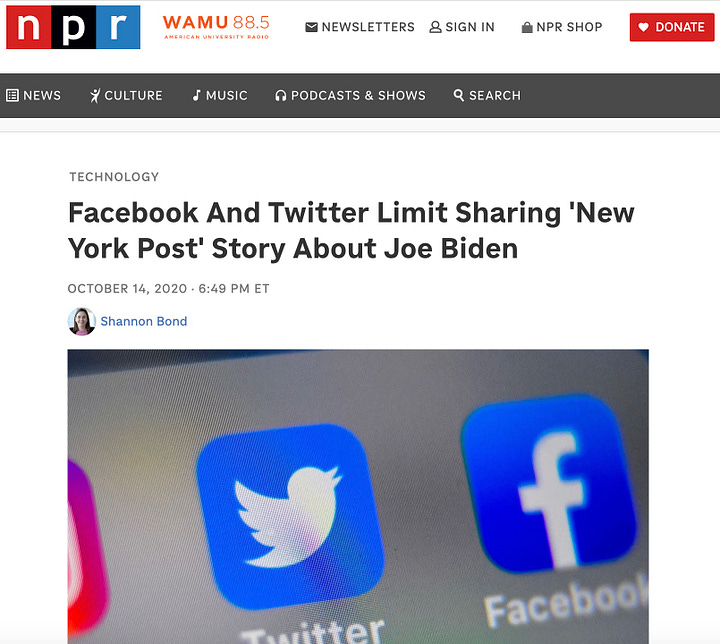
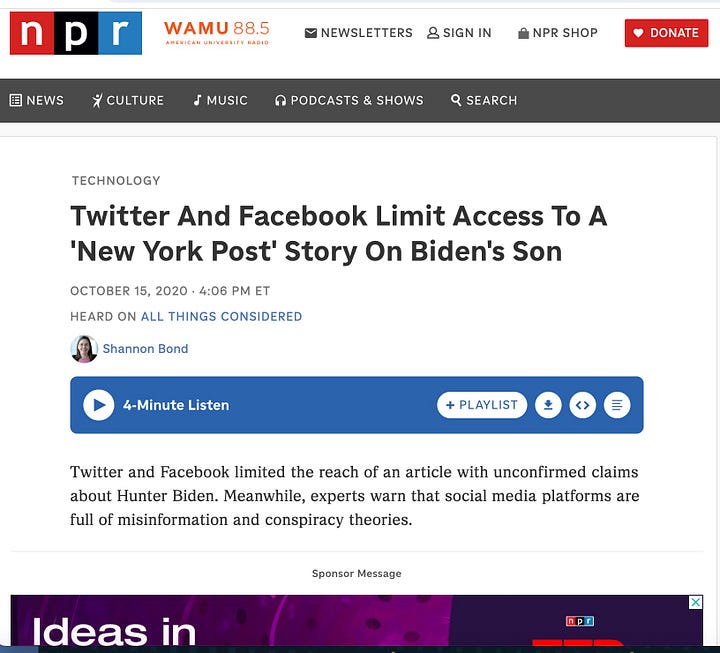
But the story really took on a life of its own on October 19th, when Politico published a piece titled “Hunter Biden story is Russian disinfo, dozens of former intel officials say.” That article alleged that, according to a group of wise and respected elder statesmen of the intelligence community, the Post story was, in fact, Russian propaganda (the same boogeyman that had helped get Trump impeached mere months before).

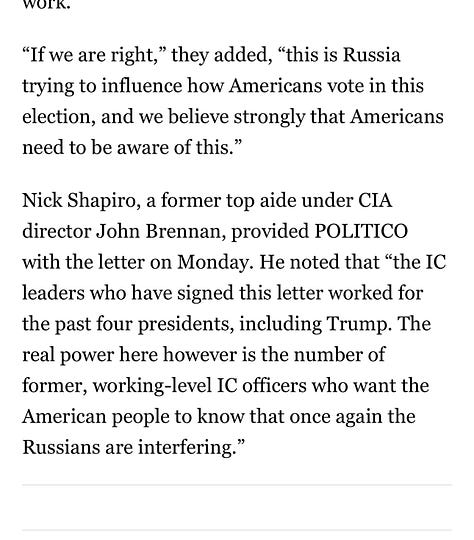

And you’ll notice that the framing of the story and its choice of image was squarely about the younger Biden.
Politico was the starting gun for the rest of the press. Outlets picked up the “Russian disinformation” claim—thin as it was—and declared the whole matter a willful attempt to mislead the American people.
From there, the media unveiled some of the most head-spinning takes I’ve ever witnessed.
CNN had on James Clapper, a former Director of National Intelligence who signed the letter, who claimed (in words that echo around my skull when I think about this story) it was “classic textbook Soviet Russian tradecraft at work.” The CNN host nods along.
(Later, CNN had the gall to fact-check the claim at a debate, ruling that it was only “somewhat misleading” to say that Trump “spread Russian disinformation during the debate” when, in fact, it was entirely inaccurate. It went on to say that “Biden accurately cited the letter from ex-officials,” which may be narrowly accurate, but is far from true.)
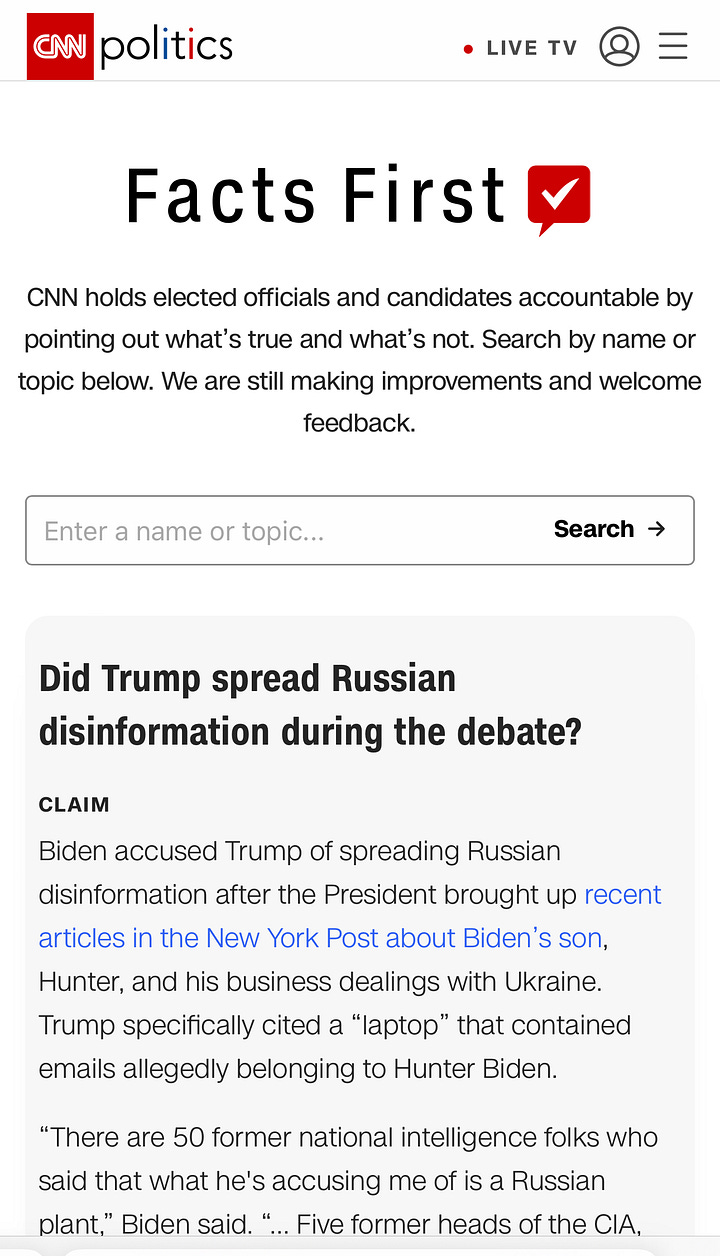
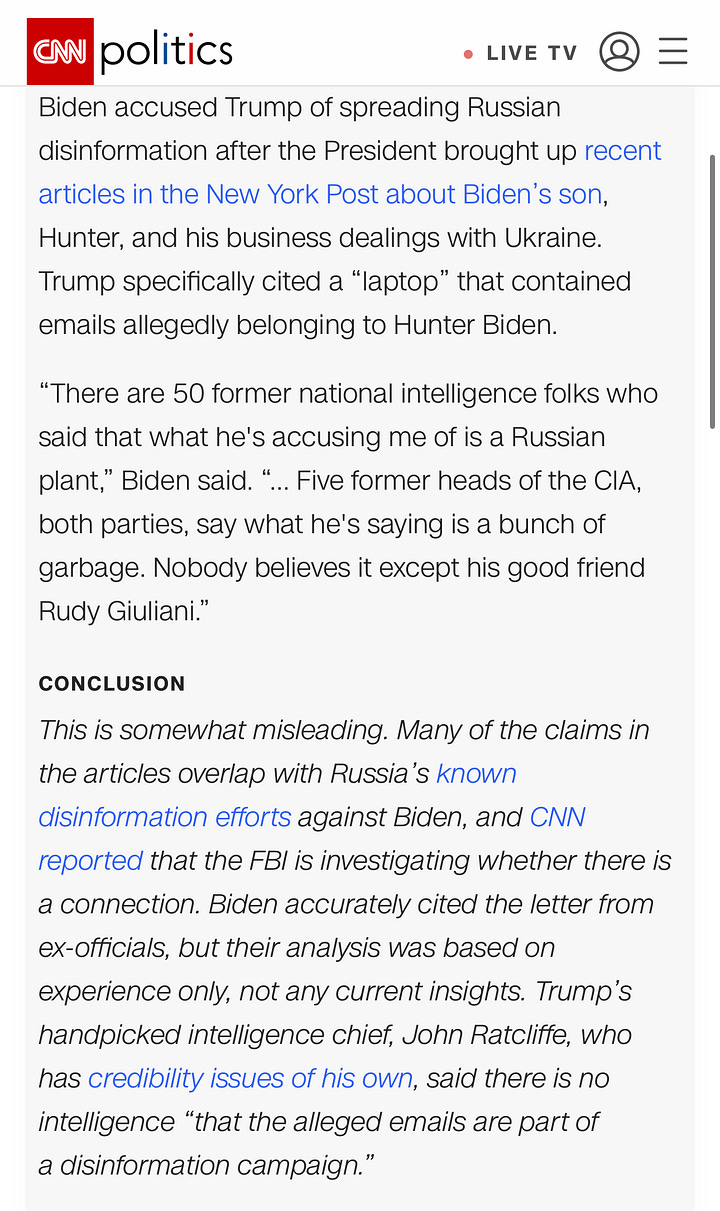
But maybe my favorite was NPR, who tweeted out explaining why they wouldn’t be talking about the story: “we don’t want to waste our time on stories that are not really stories, and we don’t want to waste the listeners’ and readers’ time on stories that are just pure distraction.” A more concise embodiment of journalistic hubris, these eyes have not seen.
And no one worked harder to obfuscate the story than MSNBC. From lawmakers to “expert” guests, the network produced a steady stream of commentators (including host and noted Russian collusion high priest Rachel Maddow) echoing Politico’s claim.



One headline that has always stuck with me came from Washington Post. Is there a universe where this headline provides clarity about the topic—the aforementioned letter from the “experts”—as drafted? As I’ve said before: headlines are an editorial choice.
Associated Press, after demeaning the Post (“a New York tabloid’s puzzling account about how it acquired emails purportedly from Joe Biden’s son has raised some red flags”) claimed that the story was Trump grasping at straws as he “tries to disparage his Democratic rival” with information that might be “tied to a foreign influence operation.”

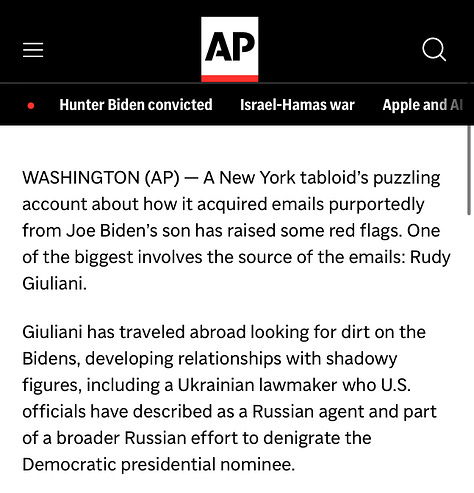

The press spoke functionally in unison: don’t pay attention to that laptop, it’s Russian disinformation! The experts said so! Here are headlines (and a tweet) from Time magazine, Business Insider, HuffPost, Boston Globe, The Hill, PBS and NBC News.
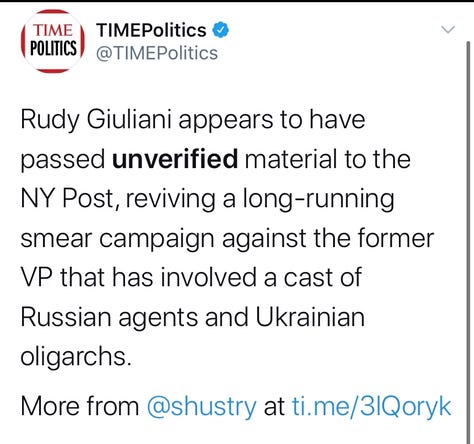
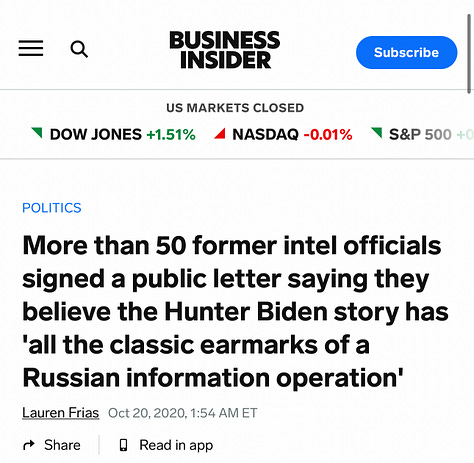


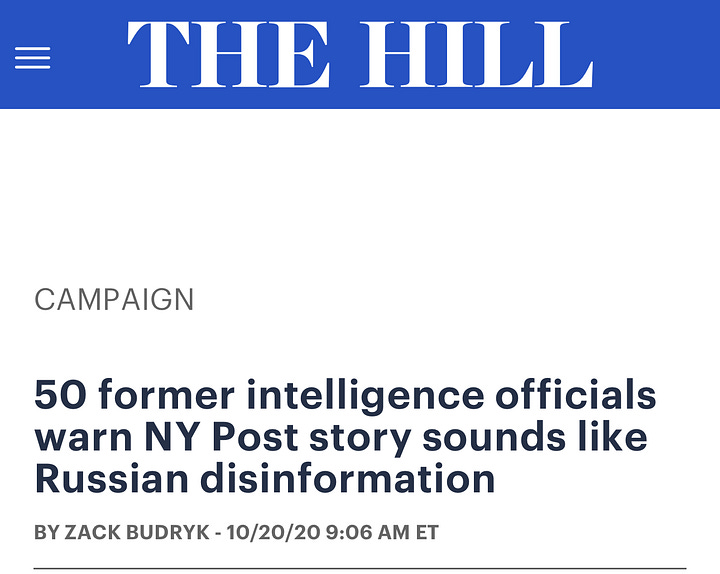
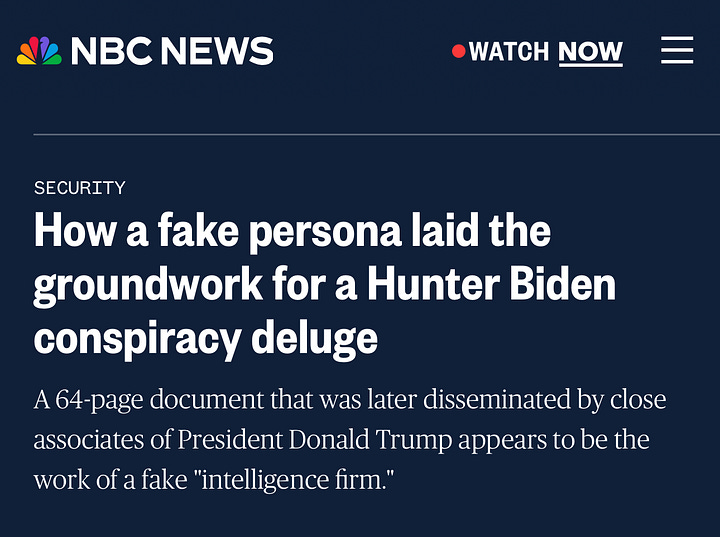
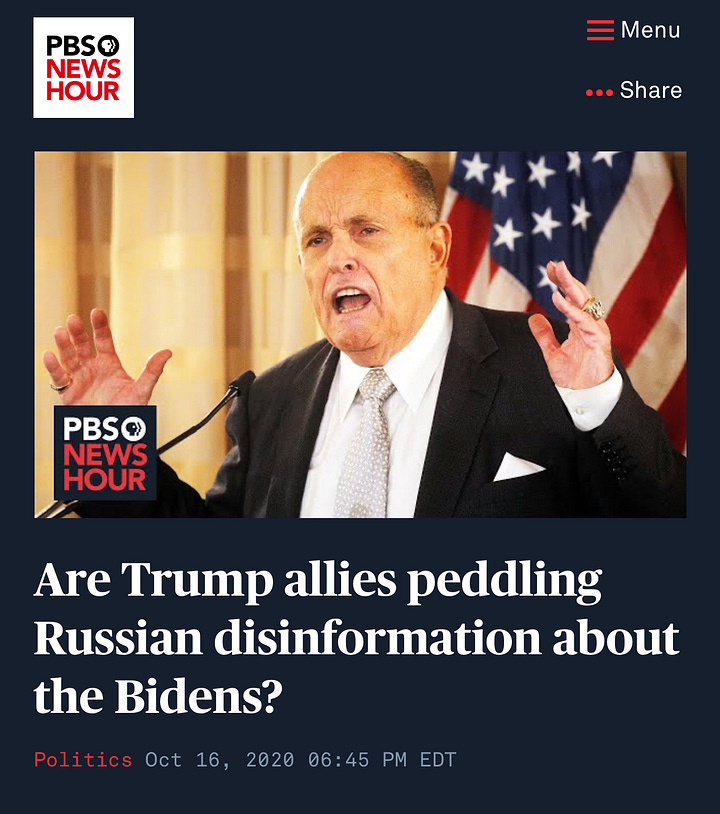
And the wise voices on Twitter chimed in repeating the refrain, including soon-to-be press secretary Jen Psaki, MSNBC’s Joy Reid, Aaron Rupar, Andrea Mitchell, and many others.


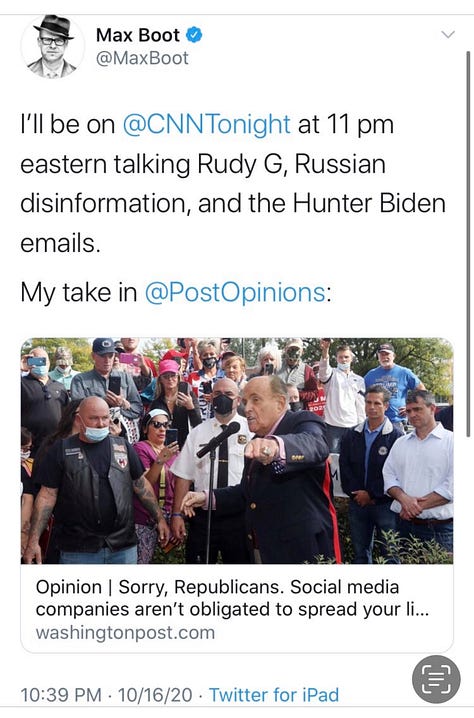
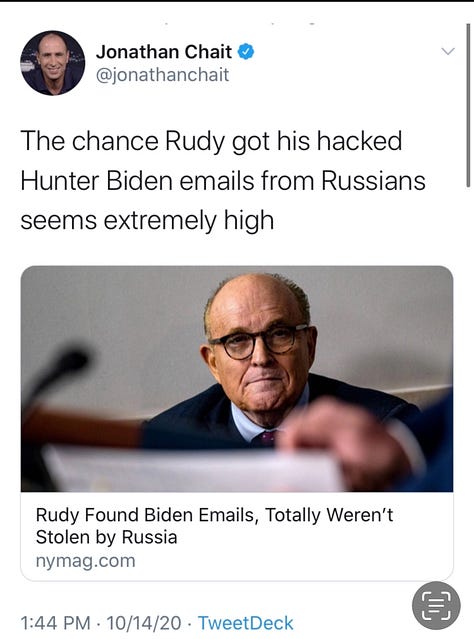
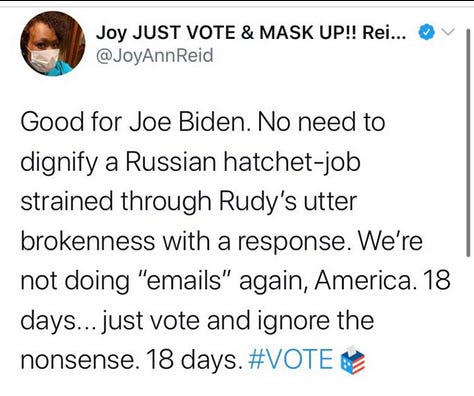

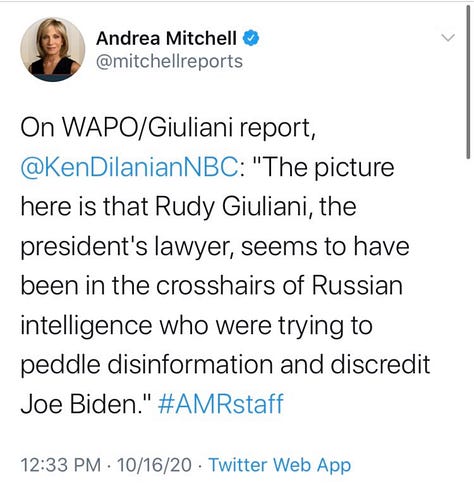

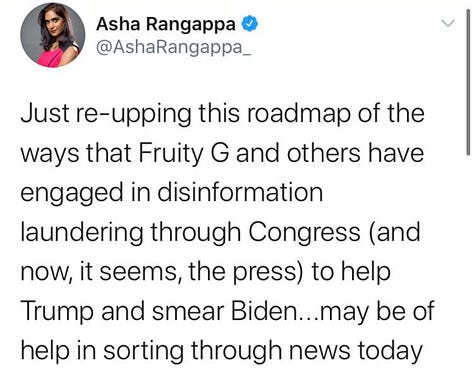
Even those outlets who didn’t pick up and repeat the supposed wisdom of those intel experts verbatim used their suspicions as grist for stories about how Russian disinformation had supposedly infected the Trump campaign through Rudy Giuliani, who had provided the initial dirt.
The Times waxed poetic about “Mr. Giuliani’s campaign to undermine Mr. Biden” by pushing “unsubstantiated claims about Mr. Biden’s wrongdoing.”


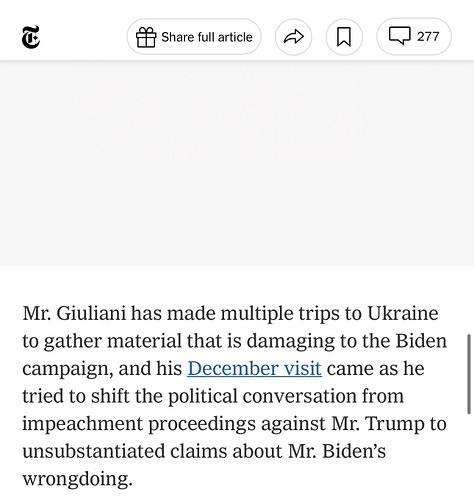
Washington Post reported likewise, saying that Giuliani’s involvement was nefarious, according to unnamed “former officials,” perhaps the same ones who had convinced Politico. To hear the Post tell it: “the intelligence raised concerns that Giuliani was being used to feed Russian misinformation to the president.” After all that, the paper got around to mentioning the laptop.
Some outlets took other angles to obfuscate the story. NPR also took issue with the bylined reporter of the piece, Emma-Jo Morris, whom they dismissed as untrustworthy, owing in part to her past work for Fox News host Sean Hannity. And lost on them was the irony of an outlet funded in part by the government implying that the source of a publication’s funding could color their coverage.


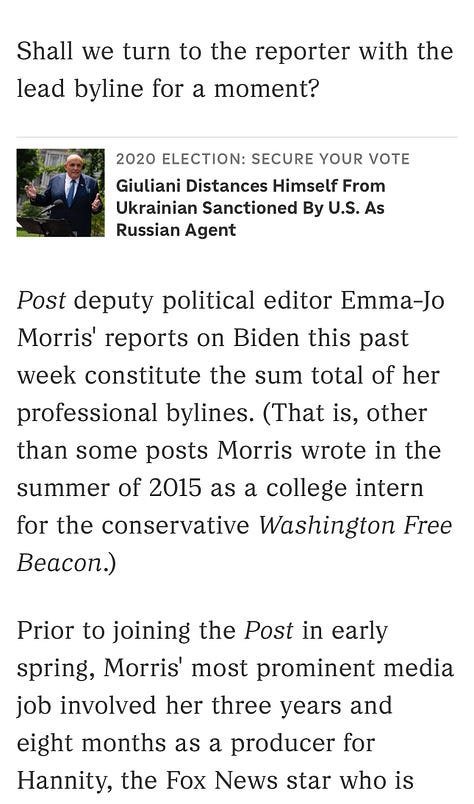
TIME magazine took further issue with the location of the information: Ukraine, where selling private information had become “Ukraine’s ‘national sport,’” according to an expert TIME cited. Back before the country’s flag dotted the lawns of my neighbors in Washington, information out of Ukraine and from Ukrainians was seen as suspect. As the TIME piece continued:
Novikov [the Ukraine expert] said it would be “nothing new” for someone in Ukraine to market such material. The trade in kompromat—a Russian word for “compromising material”—has gone into overdrive in Ukraine since last year, when the country became entangled in internal U.S. politics, especially during the impeachment inquiry against President Trump, Novikov says. Various political operatives have rushed to answer Giuliani’s call for dirt on the Bidens, creating what Novikov called a “catalyst for disinformation.” Any documents emerging from this trade should be treated with caution, he adds, because they are “extremely hard to verify, yet very easy to fake.”
How quickly we forget.
I almost can’t believe I’m writing this but the Economist claimed that the takeaway from all this is that the alleged story about Hunter indicated “the diminishing returns to disinformation” because no one believed it. The media was so good at stopping disinformation that they managed to stop a real story that was inconvenient for the Democratic candidate for president.
The facts: In drawing their conclusion that the laptop and its contents were Russian disinformation, the press appears to have made the same mistake they alleged the Post had made in its initial story: trusting, and repeating, false information that confirmed their narrative.
The thinly sourced falsehood about Russian interference didn’t hold up for long. After the 2020 election, even mainstream outlets started to back away from the story. The New York Times quietly retracted their story claiming the initial Post story was “unsubstantiated.” Hunter admitted the laptop “might be” his. Eventually, the Washington Post admitted in their reporting that the laptop belonged to Hunter and wasn’t a right-wing fever dream.

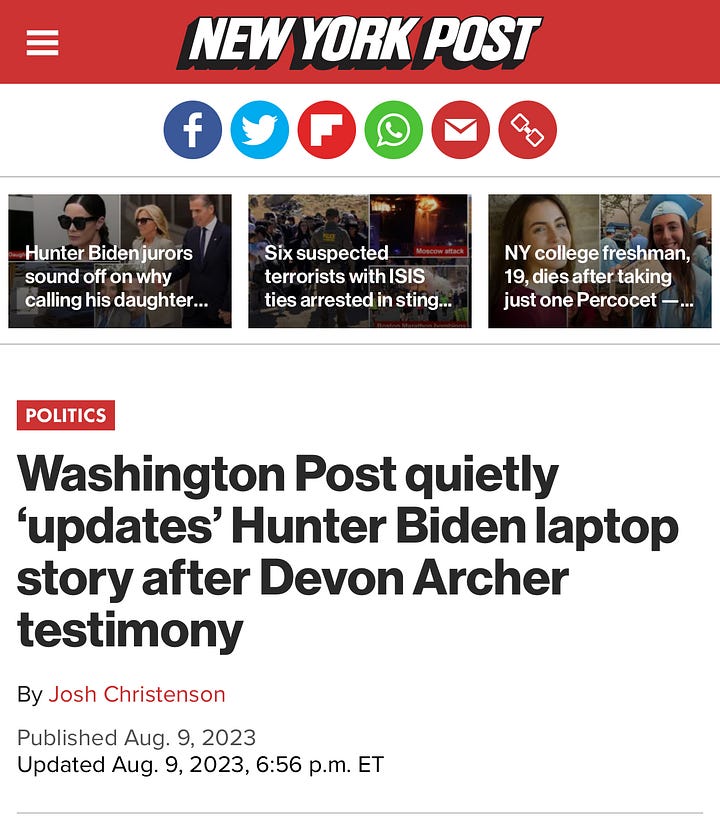
The real legwork of journalism came mostly from conservative media. The Post continued to keep the post front-and-center of the national conversation and, justifiably, reiterated the important takeaway: the laptop is real, and it indicts President Biden.
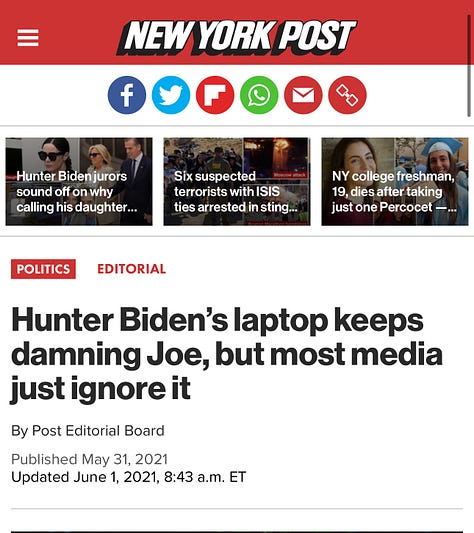

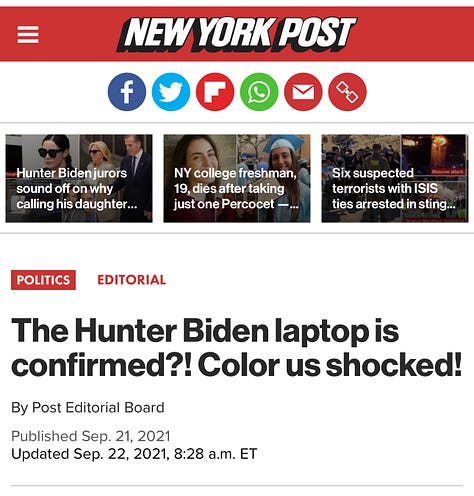
The Washington Examiner conducted a forensic examination of the laptop in 2022 determining that it was “indisputably authentic” and not hacked.
In 2023, whistleblower reports confirmed that the Department of Justice knew the Hunter laptop wasn’t manipulated all the way back in 2019 but allowed the public to believe otherwise.
The Washington Free Beacon unraveled the deception further, reporting how the bogus story was invented by the Biden team as a political ploy in 2023, citing behind-closed-doors questioning by Republicans in the House.
The fiction was concocted by now-Secretary of State Antony Blinken who was then a key member of Biden’s campaign, to put distance between the candidate and a damaging story the team couldn’t rebut on the merits:
Former CIA deputy director Michael Morell told the House Judiciary Committee in a closed-door interview that he organized a group of 50 former intelligence officials to sign the letter after discussions with Sec. of State Tony Blinken, who served on the Biden campaign. Republicans on the committee revealed details of the interview Thursday, in a letter to Blinken which claims the Biden campaign’s actions "had the effect of helping to suppress the Hunter Biden story and preventing American citizens from making a fully informed decision during the 2020 presidential election."
In January of this year, Biden’s own Department of Justice referenced the laptop in the case against Hunter, again saying under oath that the laptop was legitimate, and that the contents matched Hunter’s iCloud and other known accounts.
And the real icing on the cake came last week, when the Biden DOJ introduced the laptop—that same piece of metal that was once supposedly a Russian hoax—into evidence in the case against Hunter Biden. The same Biden admin who had fought tooth-and-nail to bury the laptop as “disinformation” was now relying on it as a definitive source of evidence, under oath, about Hunter Biden.
It’s hard to envision a narrative more fully eviscerated.
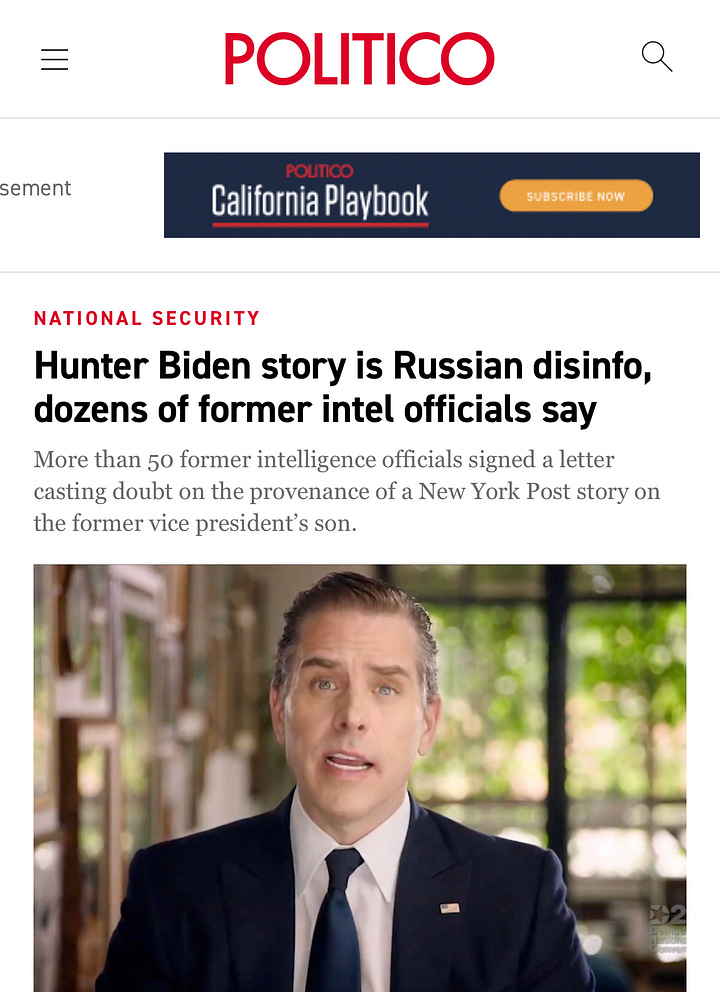

But lost in that shuffle was that key detail: the allegations of corruption against President Biden. The story instead became about Russian disinformation, Hunter’s lurid photos, drug addiction, media bias, and the actions of social media giants. It should have been that the soon-to-be president, while he was vice president, pressured a foreign government to remove a prosecutor who was threatening his son’s professional interests, and did so after meeting with the people who were paying the son. It should have been about corruption and abuse of power.
Voters should’ve known all that before they went to the polls. Our recollection of what happened should be tied firstly to that. Instead, the ruse worked. The detail got lost in the scuffle. Biden won the 2020 Election.
But voters felt duped. A 2022 poll found that 80 percent of respondents believed that Trump would’ve won the election if voters knew the full story (as it was incompletely known then) of the corruption contained in the laptop. That included two-thirds of Democrats who said it would’ve changed their votes.
It’s impossible to know for certain, of course, how many voters would’ve been swayed by these facts, but in an election ultimately decided by under 50,000 votes, it’s hard to write off the possibility that the actions of the press moved the needle.
That’s particularly true because Americans are deeply concerned about public corruption. The Times published a poll in 2022 about the state of democracy, and where everyday people saw its vulnerabilities. Respondents agreed with the outlet that things were bad, but it wasn’t the reasons the Times appeared to be fishing for—not January 6th or Donald Trump or Republican state laws about voting. People’s top concern was about the old-fashioned, government-for-the-elites-not-the-people corruption and abuse of power.
Precisely the type of allegation leveled by the Post’s reporting about Joe Biden.
The takeaway: I know “election interference” is a sore subject these days. But what else can you call what the mainstream media, en masse, did?
The American press buried a story about high-level corruption involving one of the two candidates for president, the month before an election, at the behest of that candidate’s campaign, by pushing an invented lie, and hiding from voters explosive allegations that Americans are dispositionally drawn to.
The president the press put their collective thumb on the scales for ended up winning the election by a narrow margin of key voters in swing states. Only thereafter did the details of the corruption start to leak out from the mainstream press, absent any accountability, and when the story couldn’t be denied any longer
Did the media—wittingly or unwittingly—hand the election to Biden with their coverage of Hunter’s laptop? It doesn’t seem unreasonable to ask.





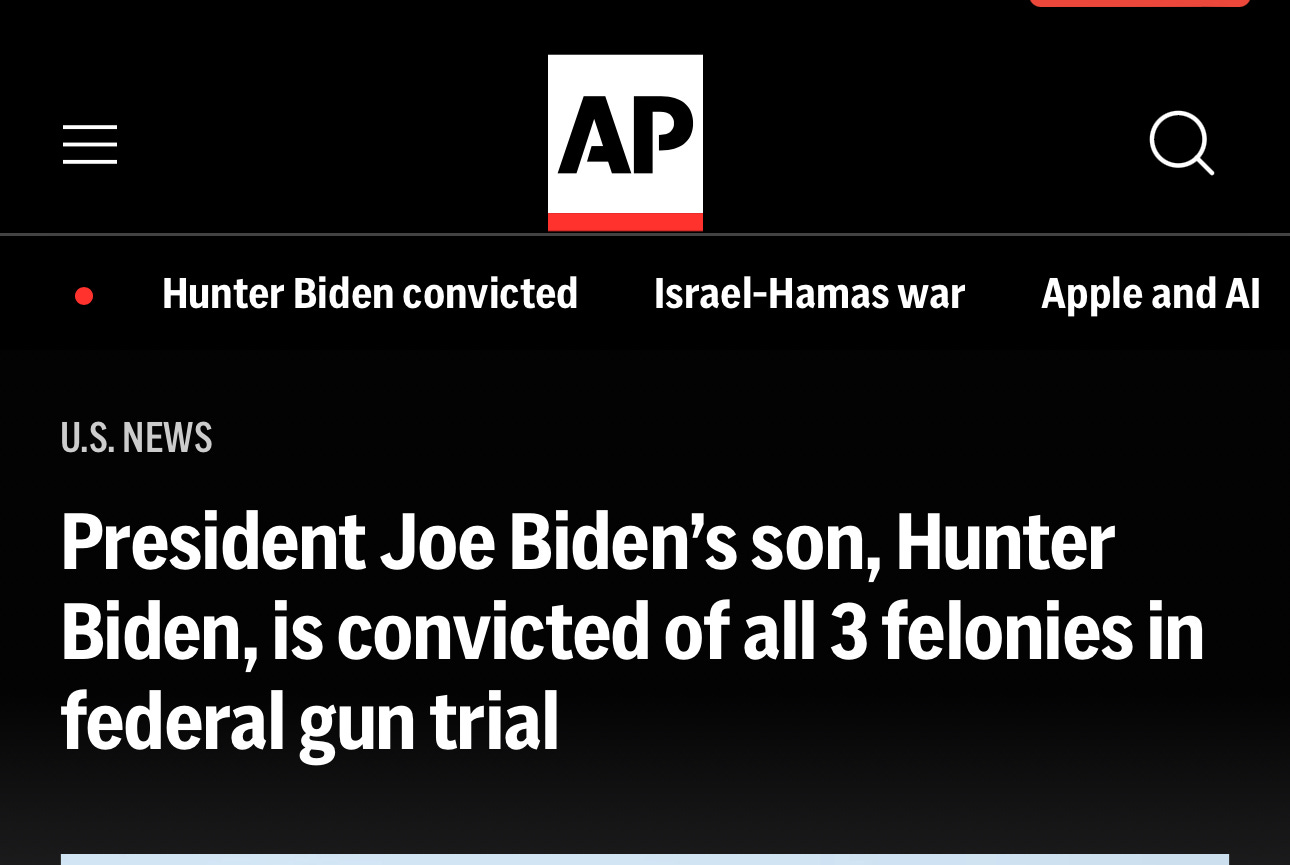

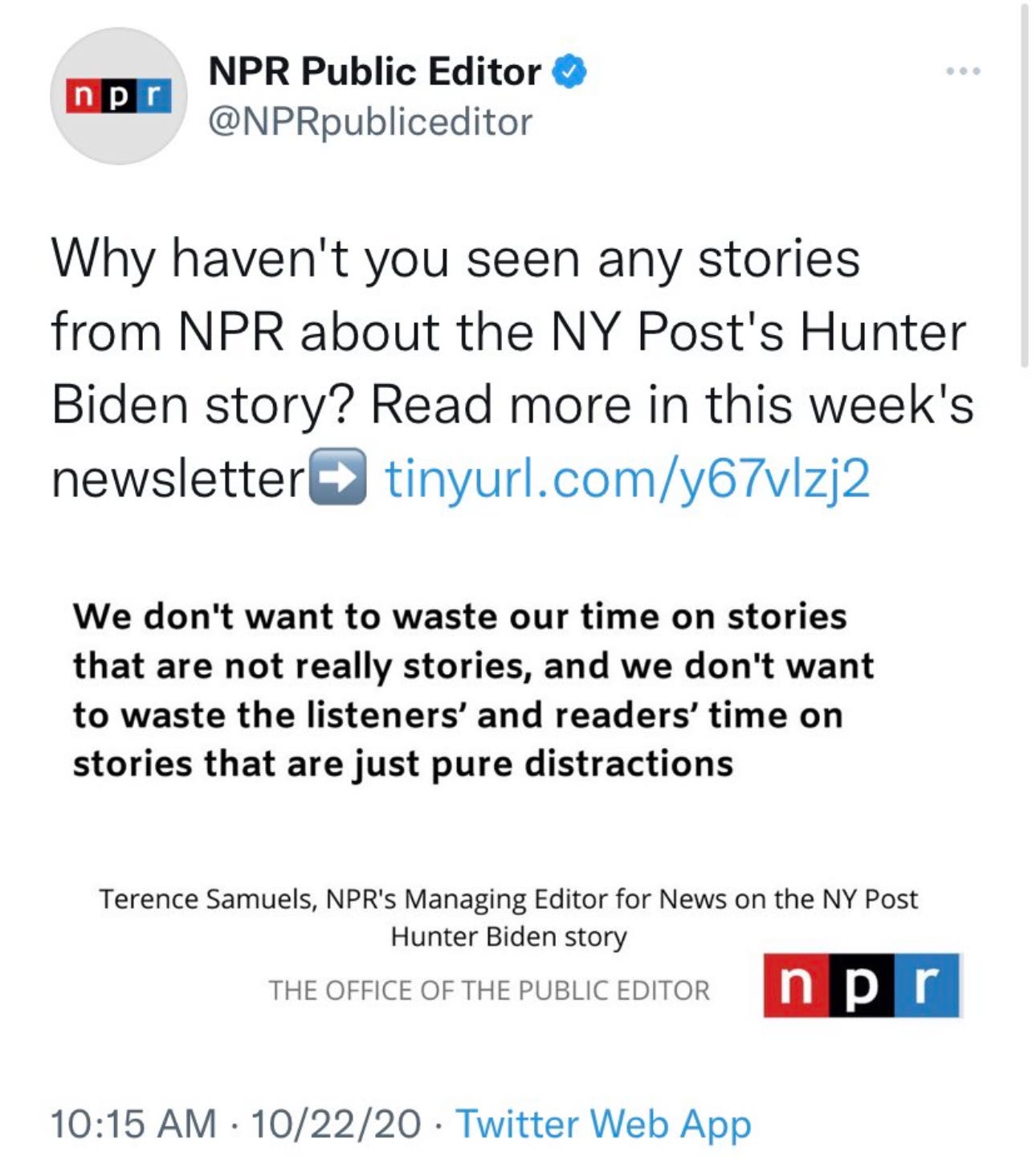
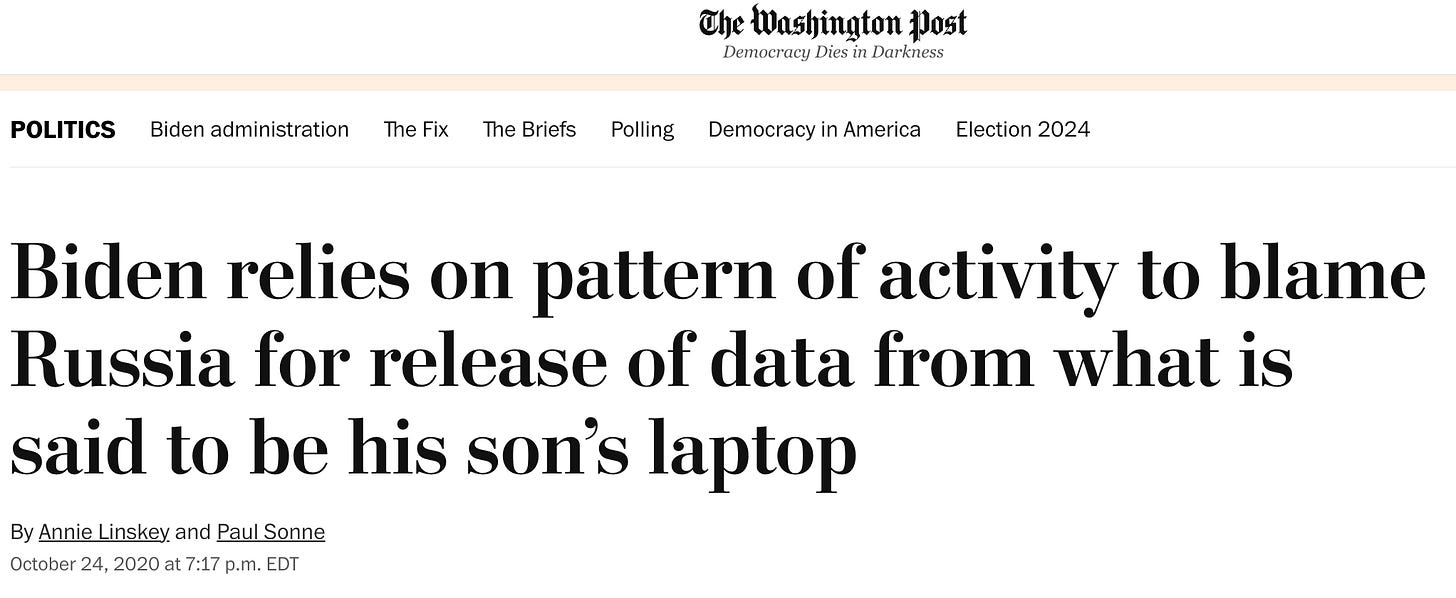





Great article, but.... how is it that you leave out THE most pertinent fact here? The FBI had the laptop for 10 months before the public became aware of it, knew it was authentic and extremely damaging to the Biden campaign, and buried it. That is our own Government - including all 51 signatories of the bogus Intel letter, all of whom knew the truth - interfering in an election, before our PRAVDA media busied itself with perpetrating the ruse. And no one is punished for this criminal abuse of power. Except for the American people who've had to endure the disastrous Biden Administration....
I don’t think anyone comes close to your lucid and systematic chronicling of what happened—and what mattered—in this story. Your reporting here is in a class by itself.